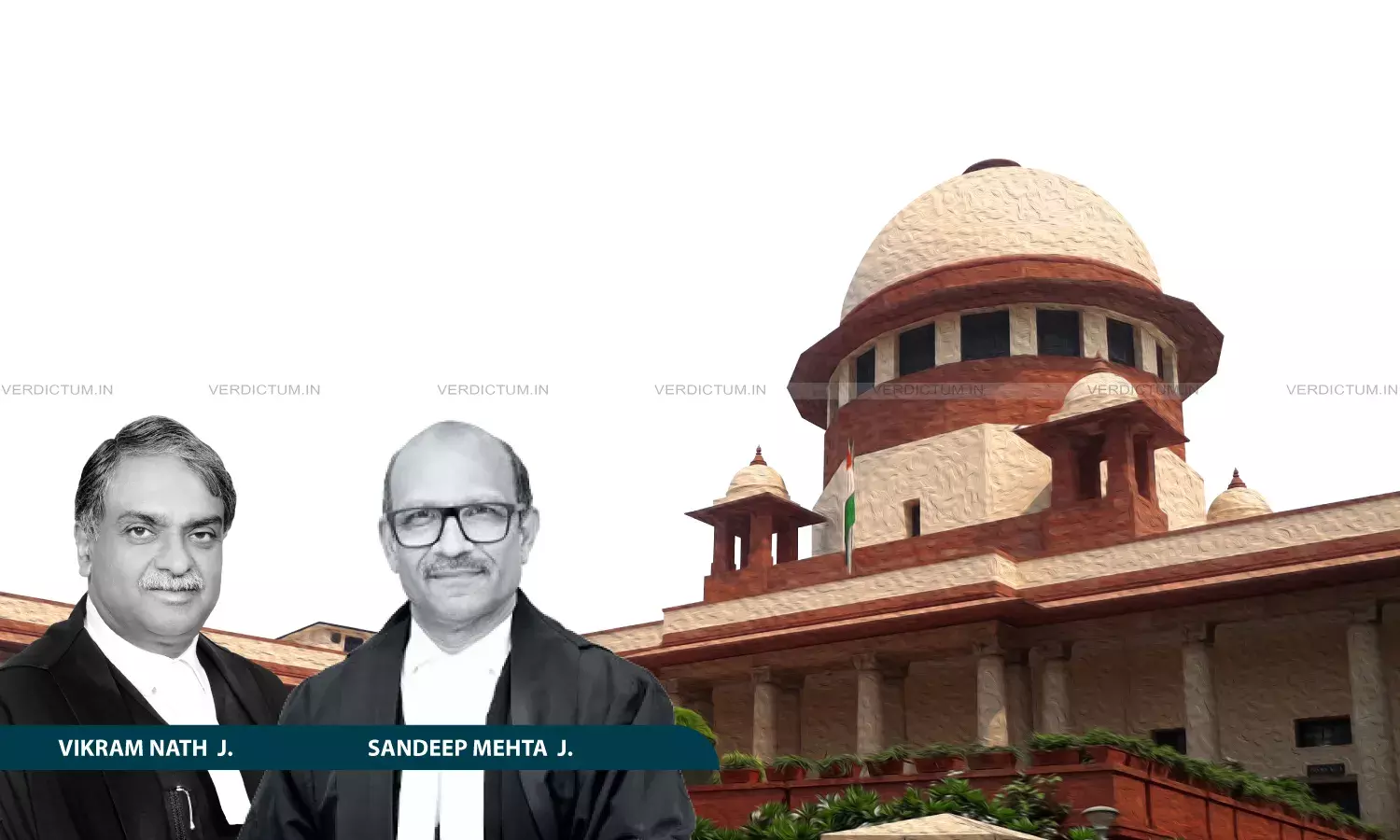Second Quashing Petition Not Maintainable On The Same Ground That Were Available To Be Raised At The Time Of First Petition: Supreme Court
The appeal before the Supreme Court was filed against the final judgment of the Madras High Court quashing the complaint registered under Sections 193, 406, 418, 420, 423, 468, 469, read with 34 and 120 of the Indian Penal Code, 1860.

Justice Vikram Nath, Justice Sandeep Mehta, Supreme Court
The Supreme Court observed that the failure of the accused to raise a pertinent ground/plea which was tangibly available to them at the time of adjudication of the first quashing petition cannot give them a right to file a subsequent quashing petition.
The appeal before the Apex Court was filed against the final judgment of the Madras High Court quashing the complaint registered under Sections 193, 406, 418, 420, 423, 468, 469 read with 34 and 120 of the Indian Penal Code, 1860.
The Division Bench of Justice Vikram Nath and Justice Sandeep Mehta observed, “Furthermore, we are of the opinion that the order passed by the High Court in the second quashing petition amounted to review (plain and simple) of the earlier order passed by the co-ordinate bench of the High Court in the first quashing petition, since there was admittedly no change in circumstances and no new grounds/pleas became available to the accused-respondents, after passing of the order of dismissal in the first quashing petition. The order passed by the High Court is in gross disregard to all tenets of law as Section 362 CrPC expressly bars review of a judgment or final order disposing of a case except to correct some clerical or arithmetical error.”
Advocate R. Venkataraman represented the Appellant while Advocate M. Yogesh Kanna represented the Respondent.
Factual Background
The complainant was engaged in travel and finance business for several years. During 2005- 2008, the complainant entered into some loan transactions with the accused-respondents who were engaged in the business of money lending. To secure the said loan transactions, the complainant gave the original deeds of several of his properties situated at Thanjavur and Chennai to the accused-respondents. The complainant cleared the outstanding amount and requested the accused-respondents to return the original deeds given as security against the loan amount. Since the accused-respondents failed to respond to the aforesaid request, the complainant was constrained to issue a legal notice seeking return of the original documents.
It was alleged that the first respondent executed a sham sale deed in respect of the complainant’s property, which was given as security against the loan amount. A complaint was filed. Thereafter, the police filed a closure report in the said case, and the same was accepted by the Chief Metropolitan Magistrate. The revision petition was dismissed and another complaint was filed. The first quahsing petition filed by the respondents was dismissed, but the second one came to be allowed. Aggrieved thereby, the appellant approached the Apex Court.
Reasoning
As per the Bench, the submission advanced by the accused-respondents that the second quashing petition came to be filed based on new grounds/pleas, was not tenable on the face of it, as the second quashing petition raised no such grounds/pleas which were unavailable to the accused-respondents at the time of adjudication of the first quashing petition. “The failure of the accused respondents to raise a pertinent ground/plea which was tangibly available to them at the time of adjudication of the first quashing petition can in no circumstance grant a right to the said accused persons to file a subsequent quashing petition as it would amount to seeking review on pre-existing material”, it said.
“This Court in catena of judgments has held that it is not open to an accused person to raise one plea after the other, by repeatedly invoking the inherent jurisdiction of the High Court under Section 482 CrPC, though all such pleas were very much available to him even at the first instance. We may hasten to add that there is no sweeping rule to the effect that a second quashing petition under Section 482 CrPC is not maintainable and its maintainability will depend on the facts and circumstances of each case. However, the onus to show that there arose a change in circumstances warranting entertainment of a subsequent quashing petition would be on the person filing the said petition”, the Bench held while referring to the judgment in Bhisham Lal Verma v. State of UP & Anr. (2023).
The Bench also reiterated that the High Courts, while exercising their inherent jurisdiction under Section 482 CrPC, cannot override a specific bar laid down by other provisions of CrPC, i.e., to say that the High Court is not empowered to review its own decision under the purported exercise of its inherent powers.
Coming to the facts of the case, the Bench noticed that the quashing by the High Court of a similar complaint, filed by the complainant against the accused-respondents in respect of properties situated at Thanjavur was an event that happened well before the dismissal of the first quashing petition under Section 482 CrPC and the said ground/plea was manifestly available to the accused-respondents while seeking adjudication of the first quashing petition. Thus, it was held that the accused-respondents were not at liberty to invoke the inherent jurisdiction of the High Court raising the aforesaid ground/plea at a later point of time by filing the second quashing petition.
Setting aside the impugned order, the Bench allowed the appeal and restored the criminal complaint filed against the accused-respondents.
Cause Title: M.C. Ravikumar v. D.S. Velmurugan & Ors. (Neutral Citation: 2025 INSC 888)
Appearance
Appellant: Advocates R. Venkataraman, Tanuj Agarwal, C. Aravindh, AOR Apoorva Singhal, Advocates Ashfaq, Akol Kumar
Respondent: Advocates M. Yogesh Kanna, S. Prabu Ramasubramanian, AOR Raghunatha Sethupathy B, Advocates Manoj Kumar A., Vinayaga Vignesh I, V. Swetha, Vasu Kalra

